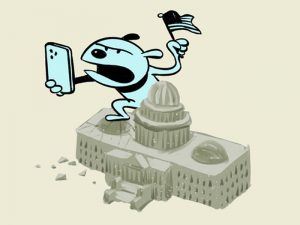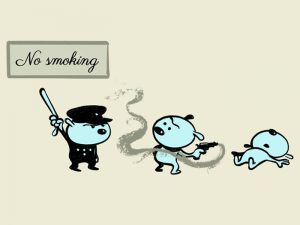Ceci n’est pas un coup

Ceci n’est pas un coup
The normative power of the post-factual (in the light of critical semiotics)
“Propaganda is not when lies are told — this is plain lying. Lies, of course, can be propaganda, but not when they are believed — in this case they simply seem to be news. Propaganda occurs when lies are told so conspicuously that a message only appears credible where it breaks with the conventions of sincere speech. Propaganda is less about blind followership than about following with eyes wide open. The ‘open lie‘, as the obvious violation of rules, propagates, as a foretaste, the infringement plain and simple.”
from: die niedlichen, “Natography”, Spex (June 1999)
Already during the 2016 U.S. election campaign, talk show host Bill Maher began calling the actions of Trump and his enablers a “slow-motion coup.”
Maher explicitly did not want his choice of words to be understood metaphorically — not as a satirical exaggeration of a merely cultural scandal of a grotesque candidacy. He was serious about the classification as a “coup d’état” in the legal sense.
In many public appearances Trump had announced to make his recognition of the election result conditional on his victory (“only if I win“); he had threatened to have his opponent imprisoned once he had become president; he had fanned the chants of “lock her up” against her for months; he had suggested to his base to take up arms if he lost the election (“‘second amendment people’ could stop Clinton“); and he had promised to grant legal-fee subsidies to lawbreakers among his supporters. In view of these and similar statements, his intention to overthrow the system could be considered unmistakably announced.
But even the following four years of ostentatious lies, breaches of norms and laws were not enough for politicians and news media to abandon understated descriptions of the intentions of Trump and his party — not even the election rigging attempts openly undertaken at the end of 2020 were able to achieve that. While on the one hand the horror at the president and his party had only grown, on the other hand the “firm belief” in the “stability of the institutions” of the “oldest democracy in the world” had been invoked again and again.
Then came the storming of the Capitol.
And even after this live-streamed attack on the highest legislative institution of the USA by violent Trump supporters (as well as, presumably, Republican members of Congress and parts of the security apparatus), representatives of politics and media for days continued to choose moderate words — both in the USA and in Germany, especially on TV.

In a paradoxical mixture of acute bewilderment and chronic obtuseness, many reports and commentaries initially downplayed the attempted coup as a breach, as trespassing, protest, riot, uproar, damage to property. Even the term “terrorist attack,” which had been temporarily favored, was basically a trivialization: terrorist attacks are intended to spread fear and destabilize — but they usually don’t come with a turnkey dictatorship. And if they do, they are what Bill Maher and others had been warning about for years: an attempted coup d’état.
Only gradually did political commentators start to refer to the Capitol storming with the very terms that are provided for offenses of this dimension in the Constitution, laws, and other legal texts, and by means of which appropriate penal consequences therefore become debatable in the first place: insurrection, sedition, overthrow, coup, and, yes, conspiracy.
The verbal restraint of many media outlets can be seen as an attempt to counter years of inflammatory rhetoric, particularly when coming from the highest levels of government, with a responsible, restrained culture of discussion. But one can also see it as a dangerous and questionably motivated underselling.

When fires are actually started, the use of the word “arson” is no longer a matter of style. When parliament buildings are stormed, as it happened in Berlin, Michigan, Washington, the expression “coup d’état” is no longer an illegitimate exaggeration but the appropriate legal term.
Democratic states under the rule of law use the term “coup” or semantically related terms such as “sedition,” “overthrow,” “breach of the peace,” “threat to order” in their legal texts for two important reasons.
On the one hand, of course, in order to describe cases of unlawful acquisition of power and to be able to prescribe punishments for them — such as U.S. Code §2384, which breaks down the term “seditious conspiracy” into a whole list of conditions of application, quite obviously in order to cover as many conceivable interpretations as possible in the definition of an offence which threatens the very existence of the state.
On the other hand, however, these terms are also used in order to exclude cases of an abuse of power through the state, for example through emergency laws, such as Article 16 of the French Constitution or Article 20 of the German Grundgesetz, which guarantees every German individual “the right to resist” in such cases. Even the U.S. Constitution’s infamous Second Amendment, which entitles all citizens to bear arms, does so expressly for the sole purpose of allowing them to secure a free state.
In other words: in constitutional states, laws defining cases of subversion are intended to protect state officials and other citizens from each other in both directions.
As is well known, establishing this equitable relationship between the state and its citizens has been a historical achievement – a judicial turn of the Enlightenment of sorts (in all its technocratic dialectics).
A turn, because concepts that had previously divided the members of a legal community into privileged rulers and under-privileged ruled, were now, at least de jure, in constitutions and other legal writings, no longer defined as required positive, but only as prohibited negative facts. This legal turnaround is possibly most clearly expressed in the granting of a secret, free, equal right to vote — which, however, is still glaringly imperfect in countries with winner-takes-all electoral systems such as the USA or the UK.
Therefore, in political-legal terms, the achievement of legal definitions of arbitrary power simply consists in abolishing all orders of estates and replace them with democratic structures that are as egalitarian as possible.
Culturally, however, the achievement lies in distinguishing between everyday, fuzzy uses of terms that can be stretched by anyone at will, and those that are tied to specific, scientifically legitimized, institutionally legalized procedures of definition and grounds. Only in this way can the division of the symbolic powers of culture and law be guaranteed in a reasonably transparent manner in highly normative discourses with potentially serious consequences (as is explicitly reflected in the understanding of free media as a non-governmental “fourth power”).
Thus, the practice of political discourse of the post-Enlightenment ideally attempts to always reflect the (social-)epistemic circumstance:
Concepts of culture relate to concepts of law as object language relates to metalanguage (in the sense of Russell and Tarski).
Object language: “Books are the memory of mankind.”
Metalanguage: “‘Books’ is the plural nominative case of ‘book’.”
Since one can only operate on one of these two levels of language at a time, it is crucial to make clear which level one intends to influence when engaging in discussions about politics and society.
Especially texts of the news-journalistic, scientific, expert or legal commentary kind need to clearly state whether they intend to either adopt or (essayistically) criticize the colloquial use of a term, or refer to the inherent systematics of its defined legal meaning.
In art or in cultural journalism, as gray areas between the arbitrary public and the professional public, the unconsidered jumping between these levels may still be justifiable in order to possibly render a statement more emotional, more effective.

This, however, is where the risks of overselling begin — the other side of the discourse ethics’ coin. And this side has been hammered with ever higher nominal values for years.
The inflationary use of legal negative terms has greatly increased with the rise of social media, — often in questionable intersections of left and right.
“Lie,” “fraud,” “perpetrator,” “victim,” “forgery,” “deception,” “censorship,” “deprivation of liberty,” “betrayal,” “violence,” and, yes, “conspiracy” — all of these are not arbitrarily chosen expressions of everyday culture, but juridifying terms used on a daily bas for rhetorical weaponization in all parts of the political sphere.
The more often buzzwords like these are borrowed from the law, however, the more a culture of vigilante justice becomes normalized.
Part of this regressive culture is the permanent self-victimization of the “ruled,” which no longer presents ruling conditions as changeable, but only as worthy of destruction.
For example, classifying, from an allegedly order-critical point of view, all sorts of actions as „violence“ in an inflationary manner, without keeping the term’s legal definition in mind, devalues its meaning just as much as the deflationary refusal of respective order proponents to apply it to acts that fulfill all legally defined conditions for this purpose.
It is, as ist were, in the nature of culture that most of the buzzwords it borrows from the language of law are those that, to some extent, have been popularized in the mass media — terms for fundamental rights or their violation. Those are the terms that are most valuable for a democratically constituted legal community, since the enforceability of their meanings had to be won historically at the cost of many terrible sacrifices.
Finding a viable path of debate between exaggeration and understatement is a constant balancing act — and one that is often made even more difficult by the fog of current conflicts and incalculable escalations.

The exaggerated and inflationary use of heavyweight legal terms is not only problematic, because it fuels tendencies toward radicalization in a rhetorical competition to outdo one another. It also distracts from more inconspicuous gaps in the law and failures of justice that are actually suitable for scandalization — and from something more general that could be inferred from them.
Why, for example, were the president who was voted out of office and his allies actually allowed to have the election results reviewed by the courts and at the same time continue to publicly deny them? The right to have the results reviewed should reasonably be tied to the obligation to recognize the results as provisionally open. Shouldn’t the authorities in charge of the election or any U.S. citizen have been able to sue Trump and his lawyer Giuliani for an interim injunction to refrain from making unproven allegations? Any fizzy drink bottler could have stopped such massive false claims about its product as Trump made about the community product “democratic election” for months. In the absence of such a ban, the propaganda for “taking back the country,” for overthrow, was allowed to continue uninterrupted — and this campaign again was pumped up with a pseudo-legal slogan: “Stop the steal“.
Only three weeks after the storming of the Capitol amid the clamor of this slogan, it was announced that at least one person could still be prohibited by the courts from continuing to describe the long since legally binding results of the U.S. election as a fake. The company Dominion Voting Systems sued Rudy Giuliani for injunctive relief and damages of $1.3 billion. Apparently, in the market-radical USA, even attempted coups can only be fought if they can be translated into private economic damage — in other words, if their price can be quantified.
The case, however, does not only point out weaknesses of the current law that need to be discussed. It also illustrates the general factors involved in the operating system of norms and rules.
It specifies how this works: the exchange between object language and metalanguage, the transition from culturally rampant to institutionally legalized speech acts (and back).
For an understanding of legalization, the two-part distinction between object language / metalanguage is, of course, incomplete. Logically, a third component always precedes it:
Object / Object language / Metalanguage
In this case, the “object” would be the voting machines or their most recent use by election workers and election supervisors. It will be disputed whether the construction of the machines or their operation — measured against meta-linguistically defined rules — was carried out according to or contrary to the rules — and whether the object-language assertion of manipulation either fulfills the meta-linguistically formulated facts of “permissible expression of opinion” or is to be classified as “defamation” or even “slander”.

Generally speaking, metalanguage obviously cannot turn object language into the object of legal classifications on the basis of its relation to the object language alone, but it also requires its own relation to the object of the object language — a specifically legalizing meta-object relation, so to speak.
Attacking this meta-object reference is a central tactic increasingly employed by the far right.
In endless disputes about “evidence” — in courts, parliaments, media — they do everything to plunge every meta-object reference into an infinite regress of ontological (im)provability. If one were to scrutinize this tactic, it could probably be demonstrated that the right-wing expertly makes use of the entire range of transcendental philosophical subdifferentiations in order to render the “object” incomprehensible among its many aspects as “referent”, “denotate”, “percept”, “mental concept”, “sense phenomenon”, “thing in itself”, “real object”, and, ultimately to make it disappear. To quote Trump: “What you’re seeing and what you’re reading is not what’s happening.”
This is also the case in the second impeachment trial, in which Trump’s rally video of January 6 serves as an essential object of proof. Every semantically conceivable type of counter-assertion is put forward as a defense:
“Trump didn’t say that / Trump didn’t say that in this way / Trump didn’t say that then / Trump didn’t only say that / Trump didn’t mean that / Trump clarified that earlier / Trump clarified that later“ etc.

In the chain “object / object language / meta-language”, juridification thus arises not only through the linguistic relationship of the last two components (OL-ML), but at the same time also through the relationship of the first two (O-OL) as well as the first to the third (O-ML). And the shattering of a legal order occurs in the “normalization” of previously excluded variants of these three relations — in the normative stabilization of right (or also left), non-verbal and verbal countercultures.
The historical aspects of this constant intermingling of coding and codification could be illuminated by countless examples:
- firstly in the “objects” of non-verbal culture, i.e. the referents of the object language (O-OL), which recur on the meta-level in their own respective fields of law in the form of methodically objectifiable conditions of experience (prototype metres, reference materials, exemplary models, industrial standards, control techniques, test procedures, trial measurements, etc.). These, in turn are verbally laid down (O-ML) in regulations of guilds, professions, in trade and handicraft regulations, in food legislation, medical law, environmental law, animal rights, construction law, commercial law, insurance law, weapons law, traffic law, sports law, copyright/trademark/patent law etc., and have been fought over incessantly in the course of economic history. (Elsewhere, I suggest that the entire field of socially coordinated generated objects, which precedes the conceptual “culture” and the meta-conceptual “law”, be subsumed under the term “economy” as one of three components of socio-facts.)
- in texts of comparative law (both in historically longitudinal and systematically cross-sectional comparisons of legal systems);
- in linguistics / semiotics (more on the keyword “language change” in a moment);
- in the field of the history of science (just think of the changes in the meaning of a concept such as “work”, which in the past centuries has been subjected to increasingly divergent ramifications and criterial specifications in physics, economics, philosophy, sociology, law);
- up to the meta-medium money, which in every phase of its history has again and again taken on new forms of culturally wildly proliferating objects of exchange, which were then — provided that they were to some extent tried and tested in the eyes of sufficiently influential/affluent circles — sooner or later declared to be legal tender. At present, as is well known, this process principle is unfolding in the recognition of Internet payment services and cryptocurrencies by the Fed, banks, stock exchanges and businesses and the preparation of digital dollars, euros, crowns, renminbi, etc.

It would be worthwhile, of course, to subject each individual term that is assigned a specific normative force qua law or institutionalized use to an ideology-critical examination of the specific historical conditions that have led to its ascent to the meta-level.
Across concepts, however, — i.e. systematically — the fact that and how uses of signs, especially verbal language, enable regulative self-references has already been described quite well by and since Peirce — that is, well before the introduction of the concept of metalanguage by Russell and Tarski (both admirers of Peirce).
By the criterion “conventionalizedness” Peirces’ sign type “legi-sign / symbol” not only already captures the meta-linguistic potential of recursive communication (= sign users “agree” on rules of sign usage with signs) and even explicitly designates the implication of a normative, legal meaning (“legi”). But beyond that he explains — by the complementary demarcation of two simpler, logically preceding sign types (“sin-sign / index” and “quali-sign / icon”) — the possibility condition of the transformation of “lower” into “higher” signs.
In his two great books Sprachwandel and Zeichentheorie (1990s), the linguist Rudi Keller reformulated this sign model, which was still rather static with Peirce, as a consistently dynamic-evolutionary one. Using numerous examples from history (not only in German), as well as systematic-logical arguments, Keller presents the causal process pattern underlying the possibility, indeed the tendency, for simpler, freer types of signs to metamorphose into more complex, more tightly standardized ones.
After all, it is remarkable that precisely this metamorphosis was researched by a Peirce contemporary from a completely different angle, namely by the Austrian constitutional lawyer Georg Jellinek, who coined the now famous formula of the “normative power of the factual” in his legal-philosophical opus magnum Allgemeine Staatslehre (1900). Jellinek attributed to “factual” cultural practice not only the normative power to ascend to individual legal concepts, but even the foundation or overthrow of entire legal systems (i.e., the power to “coup”):
“Even where the emergence of a state is prepared by legal acts, […] the process of emergence itself falls outside the realm of law [meaning: within the realm of norms not written in law]. No less have profound changes in the construction of states been accomplished by acts of violence, by revolutions and coups d’état.”
Jellinek notes in this regard that — if habits do not hold up as norms or cannot be established as valid law — political processes of upheaval are usually carried out in open violence — i.e. revoking any object- and meta-linguistic mores of symbolization, so to speak. A few pages further on, however, he describes how political stability, as valid law, must continually feed on the level of the public sphere and culture while at the same time distinguish itself from them:
“Energy or inertia of the national character, dullness or critical acuteness of the public mind, ability of the rulers to assimilate the masses, and whatever else the thousandfold historical circumstances may be which determine the individual historical process, allow shorter or longer time to elapse before a political fact is recognized as rightly existing.”
A good century after Jellinek’s reflections, their starting point has shifted in a landslide from the factual to the post-factual. Above all else, a major cause of this cultural change is seen in the emergence of the Internet and social networks — in an epochal shift in communications technology and the media economy.

Political discussions are therefore currently underway about how the meta-language of law should relate to companies like facebook and twitter: Do they market a mere object — a technical tool, a platform — or are they curators of object-language publications, and would therefore have to be regulated under media and data protection law.
Like every debate on media policy, this one is primarily conducted in the medium that triggered it.
Translation Jana Reidenbach
February 9th, 2021 — Rosa Mercedes / 02